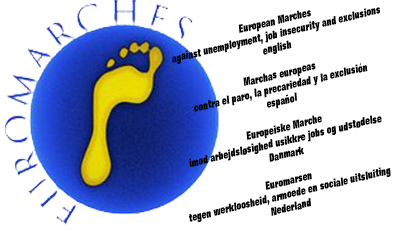This ‘action plan’ gives a first idea of how to prepare marches in 2010. We discussed it a few times inside the Belgian collective, and will submit it to the European meeting on the 4th of November in Brussels.
Onto Brussels, the capital of European unemployment
1) The financial crisis of 2008 developed itself into a socio economic crisis where the common people ended up paying the price. The European Union declared 2010 to be the year of the combat against poverty, but in 2010 the unemployment rate will increase at an explosive level and the poverty rate will skyrocket beyond imagination.
2) Since the beginning of time, the EU has been creating an institutional framework to divulge the socio economic problems to the populations of the member states : flexecurity, activation policies, privatization, primacy of the market in relation to social rights…
3) During the second half of 2010 Belgium will be president of the council of ministers. In 2010 Brussels will be the capital of European policy, more so than usual.
4) Brussels is a frontrunner in the league of European capitals when it comes to the levels of unemployment, social exclusion and poverty. In September 2009 the unemployment number was up to 20.6%, and even 33% in the younger demographic. Europe seems to be blind however, even to the poverty that surrounds it ivory,- or rather glass and steel,- towers.
Our message for the Euromarches 2010
We want to see the Euromarches 2010 grow to be an answer to the European misery. We’re working on a European instrument that can give a pan European expression of solidarity, connectiveness with the world. This with an eye on the long dark winter of our discontent which we are facing in this economic climate.
Our message is lodged on two pillars:
= How the people are experiencing the crisis, in stark contrast with the omnipresent activation plan, which the European union has been proselytizing. Throughout the marches the reality of the crisis as the people have been experiencing it, should become clear.
= Our alternatives, summarized in our appeal, and furthermore developed into all sorts of initiatives interwoven with the actual march. (Draft call for European marches).
The big stages
– The French demonstrations on the 5th of December 2009
– The ESF EPA in Berlin on 29-31 January 2010
– A conference in April or may in Brussels: putting the marches on the map.
– The ESF in Istanbul in June 2010: get the European social movement involved.
– In august, September and October 2010: the marches.
– October 2010: Closing conference, and re-launching the network.
A PLAN OF COMMUNICATIONS
Euromarches 2010 has a need for a clear communication strategy, a series of marches in Europe from August until October to bundle one communal message.
In that perspective it is crucial to improve the public visibility of the Euromarches:
– The creation of a media campaign on the regional and national level, set up around the marches and other activities.
– A strong web presence ( and a recognizable logo) where people can meet and form opinions.
– A new mailing list and a presence on the web 2.0
– This will require that all participating European nations share the media resources: moving image and still image material, as well as articles and other sources.
– This requires a strong team of European translators, otherwise communication becomes impossible= URGENT TOP PRIORITY.
Who does what?
- the coordination and communication between different European initiatives and marches.
- Coordination with the world women’s march which will mobilize around the same period.
- the Belgian collective is responsible for:
a) visible reception of the marches in Brussels in October 2010
b) closing conference in that same week
c) The organization of an action or manifestation in Brussels as closing ceremony ( in coordination with other European activities in Brussels on, or around October 17th)
- The Belgian collective has to organize the logistical aspect of the different European marches to Brussels, in the weekend of 15-17 October 2010:
– Local meeting points for marchers from European countries; via: Ghent, Antwerp, Liege, Charleroi, Mechelen, Louvain….including lodgings and entertainment.
– The contacting of Belgian and local authorities in relation with the presence of the marchers, and health and security matters.
– Cooperation with Belgian trade unions, anti-poverty organizations and other native social initiatives.
– The preparations for decent lodging and feeding of participants. The coordination and assurance of quality.
- A permanent presence for the organization in Brussels?
FUNDING
We’re working with decentralized budgets per participant nation. Marches towards Brussels and local reception committees are self sufficient.
To coordinate targets which Euromarches proposes in reaching, there is a dire need for means.
We also want to help and encourage our members to get European funding wherever and whenever possible.

